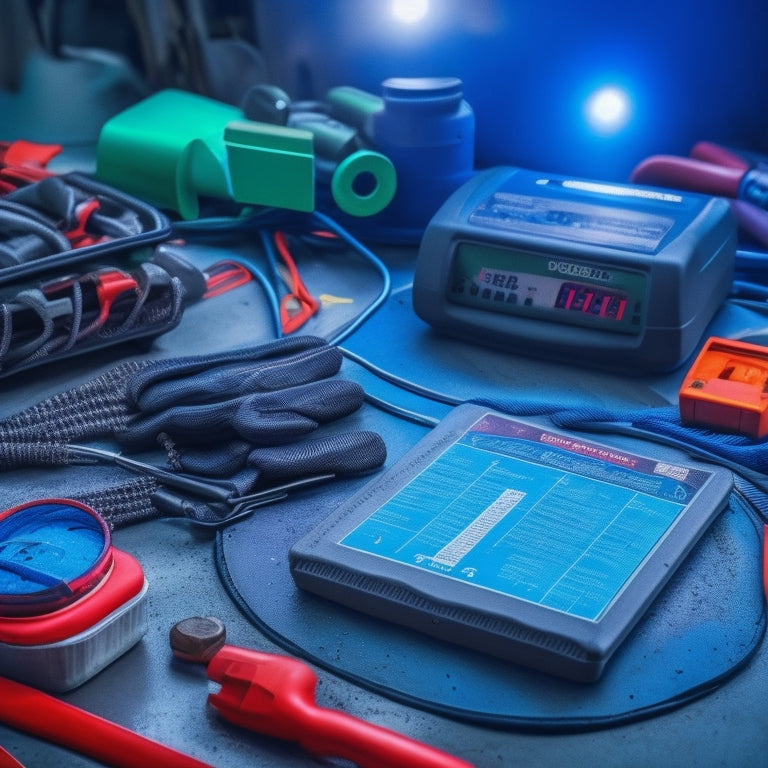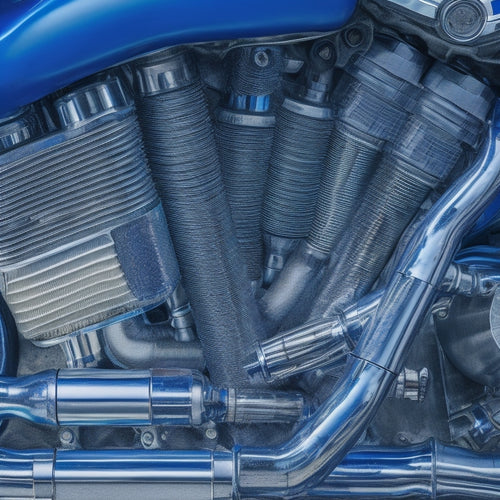
5 Essential Car Battery Maintenance Tips
Share
You can extend your car battery's lifespan and prevent unexpected breakdowns by following five essential maintenance tips. Check your battery water levels regularly, every 3-6 months, to prevent damage to internal plates. Avoid deep discharging, which causes irreversible damage, by keeping the battery level between 20% and 80%. Clean your terminals and connectors monthly to prevent corrosion, and monitor your battery's age and health to anticipate replacement. Finally, store your battery properly when not in use, in a cool, dry place away from metal objects. By following these tips, you'll be well on your way to maximizing your car battery's potential.
Key Takeaways
• Check battery water levels every 3-6 months and top up with distilled water to prevent internal plate damage.
• Avoid deep discharging by keeping the battery level between 20% and 80% to extend its lifespan.
• Inspect and clean terminals and connectors monthly to prevent corrosion, and apply a corrosion-inhibiting coating quarterly.
• Monitor the battery's age and health by tracking its age and checking voltage regularly to anticipate replacement.
• Store batteries in a cool, dry place away from metal objects, with clean terminals, when not in use to maintain their condition.
Check Battery Water Levels Regularly
You should inspect your car battery's water levels every 3-6 months, as low water levels can cause damage to the internal plates, leading to reduced battery performance and lifespan.
This regular check is important to maintain the electrolyte balance, which is necessary for best battery function.
When you inspect the water levels, make sure to use distilled water to top them up, as tap water can contain minerals that can affect the electrolyte balance.
Additionally, check the water quality by looking for signs of contamination, such as sediment or rust, which can also disrupt the electrolyte balance.
If you find any contamination, it's best to replace the battery to avoid further damage.
By maintaining the correct water levels and ensuring good water quality, you can extend the life of your car battery and prevent premature failure.
Avoid Deep Discharging of Batteries
By preventing deep discharging, you can greatly extend the lifespan of your car battery, as excessive depletion can cause irreversible damage to the internal cells. Deep discharging occurs when your battery is drained below 50% of its capacity, which can noticeably reduce its battery life.
In fact, research suggests that deep discharging can decrease the number of charge cycles your battery can handle. Ideally, you should aim to keep your battery level between 20% and 80% charged to maximize its lifespan.
To avoid deep discharging, make it a habit to start your engine regularly, especially if your car is parked for an extended period. Additionally, avoid using high-power accessories like winches or lights when your engine is turned off. If you must use these accessories, make sure you have a battery with a high cold-cranking amps (CCA) rating to minimize the discharge.
Keep Terminals and Connectors Clean
Corrosion on terminals and connectors can significantly impede the flow of electrical current, so it is important to clean them regularly to guarantee peak battery performance. You'll want to inspect your terminals and connectors frequently to prevent corrosion buildup. When you notice corrosion, it's vital to remove it promptly to maintain peak battery function.
Here's a step-by-step guide to cleaning your terminals and connectors:
| Step | Action | Frequency |
|---|---|---|
| 1 | Inspect terminals and connectors for corrosion | Monthly |
| 2 | Remove corrosion using a wire brush and baking soda | As needed |
| 3 | Apply a corrosion-inhibiting coating to terminals and connectors | Quarterly |
Remember to always disconnect the negative battery cable before cleaning to prevent any accidental short circuits. By following these simple steps, you'll ensure your car's electrical system operates efficiently and your battery lasts longer. Regular terminal inspection and corrosion removal will give you peace of mind and help prevent unexpected battery failures.
Monitor Battery Age and Health
Tracking your car battery's age and health is essential, as it allows you to anticipate and prepare for replacement, minimizing the risk of sudden failure. You should keep track of your battery's manufacturing date, usually indicated by a sticker on the battery case. Typically, car batteries last around five to seven years, but this can vary depending on factors like climate, usage, and maintenance.
Regularly checking your battery's voltage is also vital. Voltage fluctuations can indicate underlying issues, such as internal corrosion or worn-out cells. Use a multimeter to measure the voltage, and compare it to the recommended specifications. If you notice any irregularities, consult your owner's manual or contact a professional.
Additionally, stay informed about any Battery Recall notices related to your vehicle's make and model. This can help you address potential issues before they become major problems.
Store Batteries Properly When Not
When not in use, you should store your car battery in a cool, dry place away from metal objects to prevent accidental short-circuiting. This is vital to maintain the battery's health and extend its lifespan. A well-ventilated storage location with climate control is ideal, as it helps regulate the temperature and humidity levels. Avoid storing your battery in areas with extreme temperatures, such as near heating vents or radiators, as this can cause damage to the battery's internal components.
In terms of storage location, choose a spot that's away from direct sunlight and moisture. You should also make sure the battery is placed on a level surface, away from any flammable materials. Additionally, keep the battery terminals clean and free of corrosion to prevent any electrical shocks.
Frequently Asked Questions
Can I Use Tap Water to Refill My Car's Battery?
You shouldn't use tap water to refill your car's battery, as it can disrupt the electrolyte balance and contaminate the system with impurities, compromising the water quality and overall battery performance.
How Often Should I Charge My Car Battery?
"When in doubt, don't burn the midnight oil; instead, check your battery's age to determine the ideal charging frequency. Generally, you should charge your car battery every 4-6 months, but this varies depending on the battery's age and usage."
Can I Jump-Start a Car With a Dead Battery?
"When you're stranded with a dead battery, you can jump-start your car safely by following a proper jump procedure, prioritizing battery safety to avoid damage or electrical shock, ensuring a successful restart without compromising your vehicle's electrical system."
Can I Replace Only One Battery in a Dual-Battery System?
When dealing with a dual-battery system, you shouldn't replace just one battery, as it'll compromise system redundancy, leading to potential failures; instead, you should always swap out both batteries to guarantee peak performance and reliability.
Will a Battery Maintainer Drain My Car's Battery?
"You're probably worried a battery maintainer will drain your car's battery, but ironically, it's designed to do the opposite. By adjusting charger settings, a maintainer actually helps extend your battery's lifespan, so you can breathe a sigh of relief."
Related Posts
-

3 Ways to Increase Motorcycle Horsepower
You're about to unleash your motorcycle's hidden power by exploiting three key areas. First, upgrade your electric mo...
-

What Makes Eco-Friendly Car Batteries a Smart Choice?
You're considering eco-friendly car batteries, and for good reason. They offer a trifecta of benefits that make them ...
-

Why Recharge Your Car Battery With DIY Power?
By switching to DIY solar power, you can drastically reduce your reliance on expensive battery services, lower your c...


